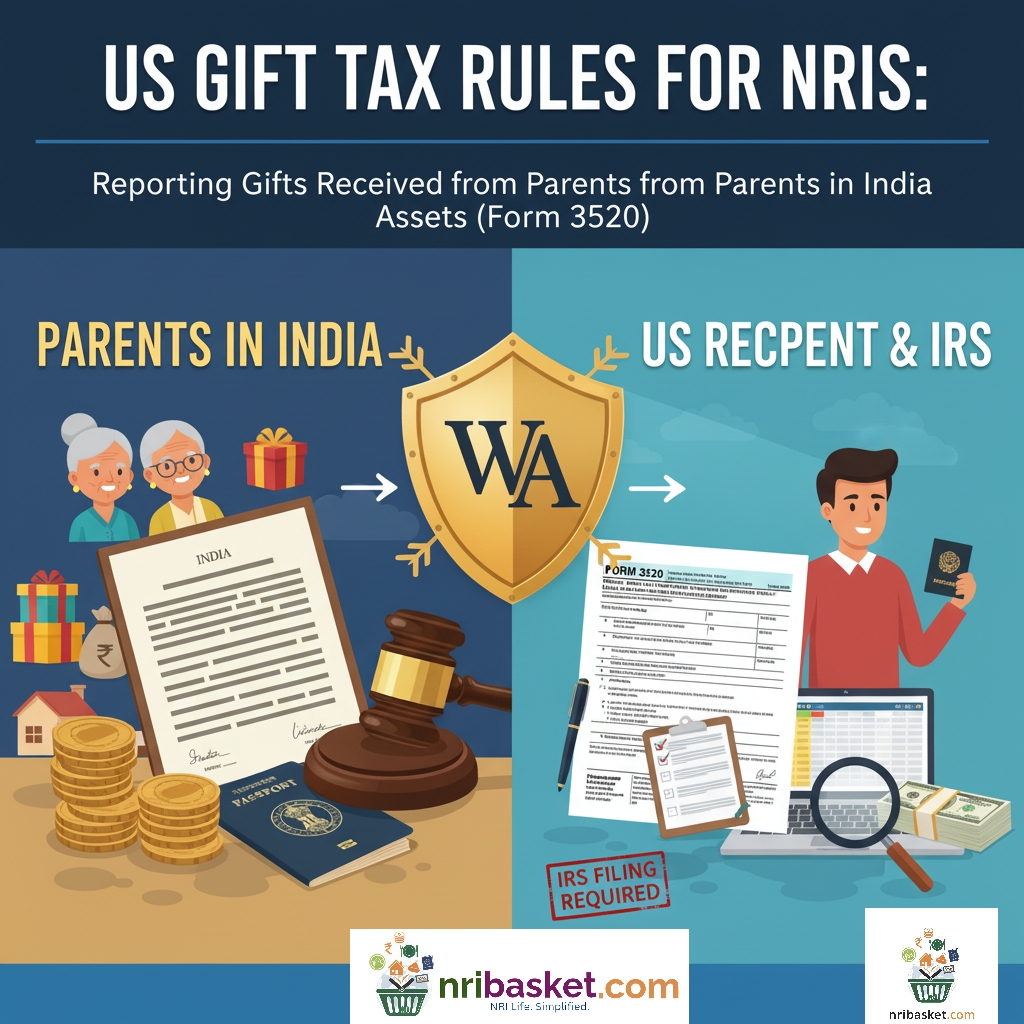
Oplus_16908288
Gifts received from parents in India are completely tax-free in the US, but large gifts must be reported on IRS Form 3520. Reporting is required when the total gift amount from a foreign individual exceeds $100,000 in a year. This includes money sent to US or Indian accounts, property gifts, and inheritance. Form 3520 is for reporting only—there is no tax involved—but failing to file can lead to heavy IRS penalties.
Long Answer: In the US, the person receiving the gift does not pay tax. Gifts received from parents in India are fully tax-free. However, if the gift crosses the reporting threshold, you must file Form 3520.
Long Answer: Form 3520 is used to report large gifts or inheritances received from foreign individuals or entities. It is not a tax form; it is only for information reporting to the IRS.
Long Answer: If you receive gifts worth more than $100,000 in a calendar year from a non-US person (like your parents in India), you must file Form 3520. Below this limit, no filing is required.
Long Answer: The IRS adds all gifts received from the same person during the year. If the total crosses $100,000, Form 3520 is required even if each transfer was small.
Long Answer: The IRS treats each parent as a separate individual. So the $100,000 threshold applies for each parent. Example: $90k from father + $90k from mother = no 3520 filing because each parent is under the limit.
Long Answer: India does not charge tax on gifts given by parents to children. So your parents can freely gift funds or property without paying tax in India.
Long Answer: The original gift is tax-free. However, any income you earn from investing that gift—interest, dividends, capital gains—becomes taxable in the US.
Long Answer: The method of transfer does not matter. Whether your parents send money to your US bank or Indian account, you must file Form 3520 if the total value crosses the threshold.
Long Answer: US residents must report foreign gifts even if the money stays in India. Location of the account does not change the Form 3520 requirement.
Long Answer: If your parent gifted you money and you kept it in NRE/NRO, it’s still a gift. But transferring your own earned money from NRE/NRO is not a gift and does not require Form 3520.
Long Answer: The value of gifted real estate or land must be converted to USD. If it crosses $100,000, Form 3520 must be filed even if the property stays in India.
Long Answer: You can use a valuation from a certified Indian valuer. Convert the value to USD using the official exchange rate on the date of gifting.
Long Answer: The IRS can impose a penalty starting at $10,000 for failure to file. In serious cases, it can increase to 5% of the gift amount per month. Filing late voluntarily can help reduce penalties.
Long Answer: US gift tax rules apply to the receiver, not the giver. Parents in India do not file anything in the US and do not pay any tax for gifting their child.
Long Answer: The IRS does not require bank statements to be attached, but you should keep proof of the gift (bank transfers, gift deed, valuation) for your records in case of audit.
Long Answer: The $100,000 threshold applies to any foreign individual—parents, siblings, relatives, or friends. If the total from a single foreign person exceeds the threshold, Form 3520 is required.
Long Answer: Gifts received from a foreign company or partnership have a much lower threshold, around $18k. Anything above that requires Form 3520 filing.
Long Answer: The IRS does not have a special exemption for wedding gifts from foreign parents. If the gift exceeds $100k, Form 3520 must be filed.
Long Answer: Using gifted funds for expenses or buying property does not trigger US tax. Only income generated from the property in the future is taxable.
Long Answer: Gifts are reportable by the receiver. If your spouse receives funds over $100k from your parents, they must file Form 3520. A gift to spouse is considered separate from a gift to you.
Long Answer: Form 3520 is not e-filed with your 1040. It must be printed and mailed to the IRS by the tax filing deadline, including extensions.
Long Answer: You can file late and attach a reasonable cause statement explaining the delay. If accepted, the IRS may waive penalties. If not, penalties apply.
Long Answer: The limit applies per calendar year. Each year, you can receive up to $100k from a foreign individual without needing to file Form 3520.
Long Answer: If your parents send money without a legal loan agreement, interest rate, and repayment terms, the IRS may consider it a gift and require Form 3520 if over the limit.
Long Answer: Money transferred by parents for tuition or living expenses is treated as a gift. If the total exceeds $100k in a year, Form 3520 must be filed.
Long Answer: A simple Indian gift deed or letter from your parents is useful for your records. It is not mandatory to submit with Form 3520 but is helpful in an audit.
Long Answer: You simply convert the gift value to USD on the date you received it. Currency type does not change the reporting rule.
Long Answer: Inheritance is not taxed in the US, but if its value exceeds $100,000, it must still be reported on Form 3520 under the “foreign inheritance” category.
Long Answer: Anyone considered a “US person” for tax purposes—including NRIs living in the US, citizens, and green card holders—must report foreign gifts above the threshold.
Long Answer: The truth is gifts from parents in India are fully tax-free in the US. The only requirement is reporting the gift on Form 3520 if it exceeds $100,000 in a year.
US tax on gifts from India parents,IRS Form 3520 India gift reporting ,NRI foreign gift rules ,Foreign inheritance reporting USA ,Gift from Indian parents to US resident,US reporting of Indian money transfers,$100,000 foreign gift threshold ,Form 3520 filing requirements,Penalties for missing Form 3520,Gifts from relatives in India to US




